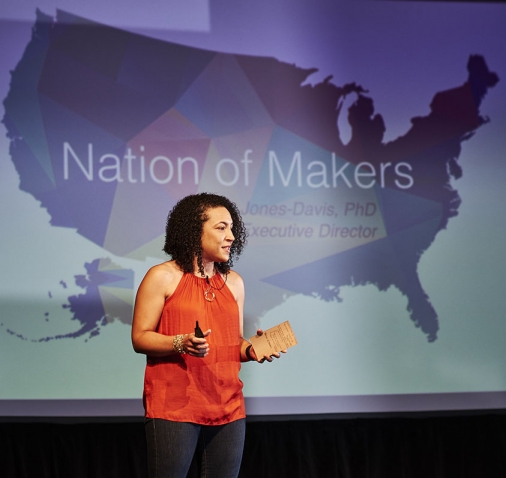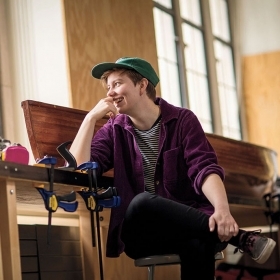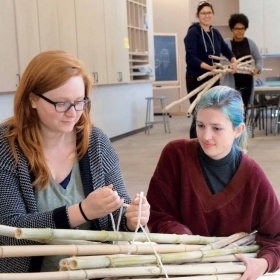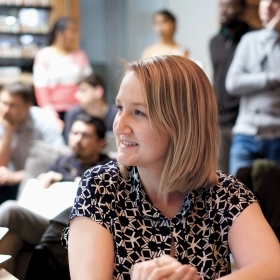In the fall of 2016, Dorothy Jones-Davis ’98 found herself on a schedule that was intense, even by Wellesley standards: For three months, she spent a full business day working at the Foundation for the National Institutes of Health, then would arrive home to turn her attention to her work as a mom. Then, around 8 p.m., she would hop on her computer and connect with a task force of people all over the country, emailing and videoconferencing until 1 a.m. as she worked to create a nonprofit to support the U.S. maker movement. But her hard work paid off: In November 2016, Nation of Makers was born, and in March 2017, Dorothy became its founding executive director.
The U.S. maker movement includes everyone who enjoys tinkering and building, whether that means crafting a toy boat out of tinfoil or constructing a solar panel. Makers often work with maker organizations that provide spaces outfitted with everything from art supplies to power tools, which is where Nation of Makers comes in.
“Our goal is to support the whole wide swath of maker organizations within the country, so that’s everything from art spaces to highly technical spaces,” Dorothy says. “So my principal job is a connector, and that looks very different from one day to the next.”
For example, insurance policies often don’t have an appropriate category for maker spaces, so Dorothy is currently working on connecting maker organizations with insurance companies. She also connects maker organizations to each other, helping them share resources and experiences.
Dorothy’s own experience making started at a young age: Her family didn’t have a lot of money, so she learned how to tinker and fix and refurbish, using whatever materials and tools she had to make something old new again. In the process, Dorothy was exposed to science, engineering, and the power of creating.
“I think it’s fundamentally human,” Dorothy says. “No matter what color, race, ethnicity, background, gender we’re from, we all have that same inner drive to create.”
Dorothy graduated from Wellesley with plans to become a scientist, earning a Ph.D. in neuroscience at the University of Michigan and becoming a postdoctoral researcher at the University of California, San Francisco.
However, a budding interest in policy sent her to Washington, D.C., where she spent two years involved in engineering education as an American Association for the Advancement of Science science and technology policy fellow before taking a position at the Foundation for the NIH, where she built public-private partnerships for Alzheimer’s research. It was during her time in DC that Dorothy became increasingly invested in the maker movement, so when she was tapped to create Nation of Makers, she jumped at the chance.
Motivated by her background as an African-American woman from a poor neighborhood, Dorothy is especially interested in helping the maker movement reach all kids, particularly those in rural or underserved areas.
“The maker movement is cool because at really young ages, kids can make a direct connection to engineering. So things like building paper circuits or doing all kinds of coding,” she says. “You can explicitly point to those things and say, ‘What you’re doing is what an engineer does, and here’s an engineer that looks like you that does this type of stuff every day.’”
At home, Dorothy is constantly making with her own 8-year-old daughter, Zuri: Together they have made everything from cardboard pinball machines to costumes. And while she never expected to be leading the U.S. maker movement, Dorothy is grateful to have ended up where she did.
“We have an ambitious mission and vision, and it’s definitely daunting some days to wake up and realize exactly how large that vision is and the scope of how much needs to be done,” she says. “But I love what I do, and can’t believe how blessed I am to be able to have my passion be my daily work.”








We ask that those who engage in Wellesley magazine's online community act with honesty, integrity, and respect. (Remember the honor code, alums?) We reserve the right to remove comments by impersonators or comments that are not civil and relevant to the subject at hand. By posting here, you are permitting Wellesley magazine to edit and republish your comment in all media. Please remember that all posts are public.